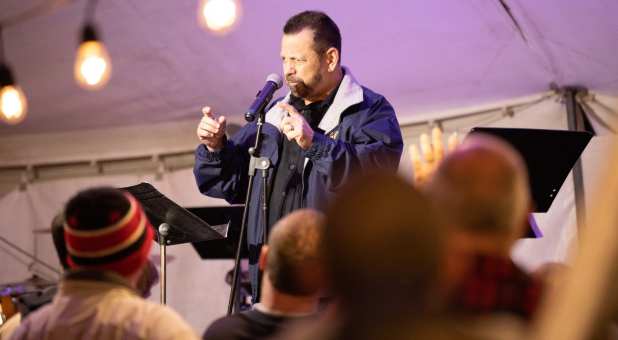Mario Murillo Says a Revival Bigger Than Jesus People Movement Has Arrived
Just before the Jesus People Movement of the 1970s, things looked terribly dark for America. A sexual revolution was fueled by the free-love culture of West Coast hippies, and drug culture was normalized on college campuses.
Evangelist Mario Murillo, who helped to spark the Jesus People Movement, readily points out the parallels between that moment in U.S. history and today. But based on what he’s seen at his tent meetings, he says this moment is bigger. “We never have enough counselors, never have enough Bibles,” Murillo says, describing the meetings. “Not even in the Jesus Movement did I see it this way.”
He continues, “In the Jesus Movement, it was widespread, and it felt gentle. This is a voracious appetite for God that I’ve not seen before.”
I’ve been around long enough to see moves of God come and go. I was personally affected by Murillo’s ministry in the Jesus People Movement of the ’70s, and I’ve witnessed Brownsville and The Toronto Blessing. Some of them, like the Roman Catholic Charismatic Movement and Promise Keepers, even filled stadiums.
When I ask Murillo how this moment in history is different, he addresses the curiosity and skepticism in my question. “The church has been fixated with a phrase, ‘God is about to.’ We hear it all the time,” he says. “We get into this state where we’re constantly expecting. What God wants is for us to realize we have to take the initiative.”
Murillo has taken the initiative. In 2021, Murillo held a series of tent meetings nationwide to get around indoor COVID restrictions, and in his most recent event, his ministry rented out the Mabee Center in Tulsa, Oklahoma, and 11,000 people attended.
Although Murillo has watched crowds of thousands surrender to Christ in his recent meetings, he’s not just impressed by the big things God is doing. He has noticed how the small act of just having human contact again after the lockdowns powerfully affects individuals.
When he talks about the unexpected success of his tent meetings, he cites leftists overplaying their hand. “Wokeness has been so devastating. Nothing it has touched has improved,” he says. “Everything it has touched has withered, and people are sick of it.”
While Murillo acknowledges that many people in America are deeply involved in sexual anarchy, heavy drinking and drugs, he sees hope in that.
Murillo tells me a story about a woman of God he knows personally. The woman’s daughter lived inside a crack house, during which time the woman would walk around the outside and pray for her daughter to be delivered. One day, someone dropped a particle of crack on the floor, and the daughter found herself wrestling on the floor for a piece of crack cocaine.
Then, it hit the daughter. “I have so degraded myself that this is what I am now,” she said to herself. “I’m nothing but an animal. I’m a creature, a monster.”
“That’s the universal experience,” Murillo says. “Jesus said, ‘Look, the fields are white to harvest.’ It’s dangerous to appeal to the lukewarm Christian when there are so many people famished for God right now. We have to deliberately go out and get them.”
Murillo is currently writing a book, It’s Our Turn Now, to encourage the American church to act during this opportune moment in our history. “Your prayers are being answered. The shift in American morality is at the door,” he says. “The danger is that we can lose it, and we can miss it. But I know that we are at that moment where it’s our turn in Jesus’ name.”
In an earlier podcast, I told the story of how Mario Murillo affected my life in 1971. He has become a good friend.
Soon, in another article, I’ll share more of my interview with Mario and report on the huge rally in Tulsa in conjunction with Flashpoint at the Mabee Center at Oral Roberts University. For now, listen to my podcast with Mario, who reveals how the church has an opportunity to offer an answer to an overplayed woke culture. {eoa}
Read articles like this one and other Spirit-led content in our new platform, CHARISMA PLUS.














































